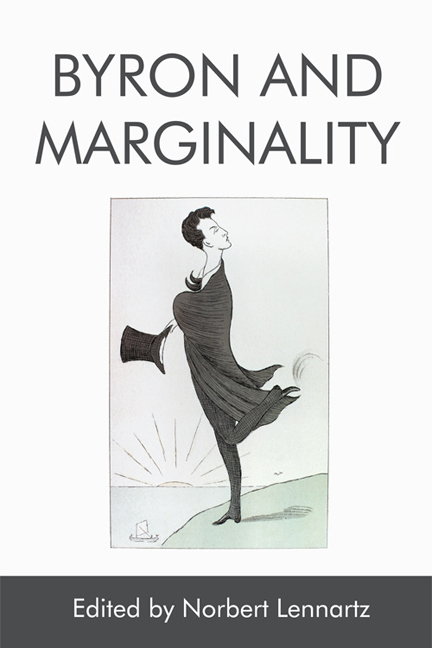Book contents
- Frontmatter
- Contents
- Foreword
- Acknowledgements
- Editions and Abbreviations
- 1 Lord Byron, Wandering and Wavering between the Centres and Margins of Romanticism: An Attempt at an Introduction
- I Byron’s Marginalisation in Romantic World Literature
- II Byron’s Marginal Identities and Places
- III Cherishing the Marginal – Marginal Genres in Byron
- IV On the Provocative Margins of Taste
- V Marginal Affairs – Visual and Paratextual Aspects in Byron
- List of Contributors
- Index
7 - Literary Forefathers: Byron’s Marginalia in Isaac D’Israeli’s Literary Character of Men of Genius
Published online by Cambridge University Press: 06 May 2021
- Frontmatter
- Contents
- Foreword
- Acknowledgements
- Editions and Abbreviations
- 1 Lord Byron, Wandering and Wavering between the Centres and Margins of Romanticism: An Attempt at an Introduction
- I Byron’s Marginalisation in Romantic World Literature
- II Byron’s Marginal Identities and Places
- III Cherishing the Marginal – Marginal Genres in Byron
- IV On the Provocative Margins of Taste
- V Marginal Affairs – Visual and Paratextual Aspects in Byron
- List of Contributors
- Index
Summary
Lord Byron's most significant marginalia occur in Isaac D’Israeli's The Literary Character of Men of Genius. This is not surprising, for Byron read D’Israeli's book twice, in 1810 and 1811, as a young man in Athens. ‘I have read [D’Israeli's works] oftener perhaps than those of any English author whatever – except such as treat of Turkey,’ he wrote. With every new edition, D’Israeli incorporated Byron's marginalia. ‘The Literary Character, Illustrated by the History of Men of Genius, Drawn from their own Feelings and Confessions spanned almost the entire career of Isaac D’Israeli,’ Spevack notes, ‘appearing first as an Essay on the Manners and Genius of the Literary Character in 1795 and in four further editions.’ ‘I don't know a living man's books I take up so often, or lay down more reluctantly, as Israeli’s,’ Byron wrote on 24 November 1818. When he received a copy of the third edition on 10 June 1822, Byron confessed that ‘the Literary Character has often been to me a consolation, and always a pleasure’.
Two points bear emphasis. First, Byron read D’Israeli's book twice in Athens (1810) and at least once in Venice (1818), both before and after he became famous. D’Israeli's 1795 edition ‘of An Essay on the Literary Character, with ms. Notes, was obtained by John Murray, who showed it to the author’. Murray obtained the book ‘probably in Nov. 1815 when he bought Byron's library’, and incorporated Byron's marginalia into the second and third editions, often without notifying him. On 4 November 1818, Byron complained in two long paragraphs about Murray's ‘breach of confidence to do this without my leave’. Secondly, the annotations themselves are more numerous than originally thought. Though Andrew Nicholson transcribed the majority of Byron's penned marginalia, he did not include pencilled annotations, fifty-seven of which were made by either Captain Thomas Fyler (the English captain who returned D’Israeli's book to Murray), Anna Jameson (England's first female art historian, who borrowed Byron's annotated copy of D’Israeli from Fyler) or Lord Byron. My argument is that they are primarily Byron’s, with the exception of two that may well be by Anna Jameson.
- Type
- Chapter
- Information
- Byron and Marginality , pp. 116 - 140Publisher: Edinburgh University PressPrint publication year: 2018



